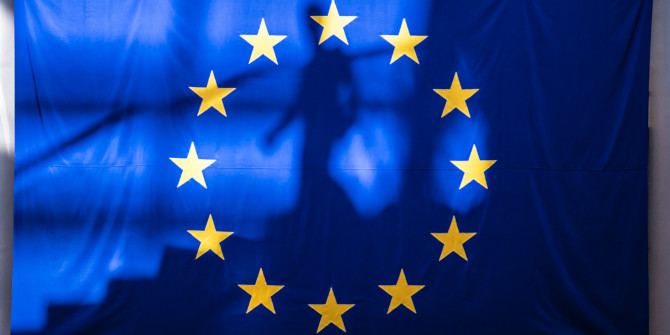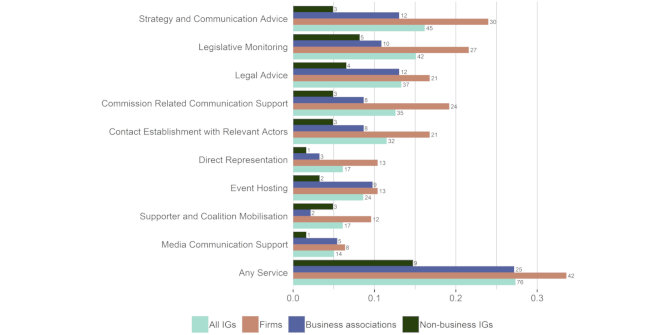The European Commission has played an important role in the EU’s response to Russia’s invasion of Ukraine. Calle Håkansson explains how the Commission has seized the opportunity presented by the war to reinforce its influence over European defence policy.
Russia’s full-scale invasion of Ukraine has been described as “a tectonic shift in European history” and a turning-point for European defence. It has prompted new EU decisions to be made using an unprecedentedly fast decision-making process. In a recent study, I investigate the steps taken by the European Commission in response to the war – and what these tell us about the Commission’s wider geopolitical role.
Security and defence policy integration
The Commission has traditionally been seen as having limited competence over EU foreign, security and defence policy. Nevertheless, in recent years, the Commission has strengthened its role in these policy domains. In response to the war in Ukraine, it is evident the Commission has taken several new steps forward in this process.
To understand the decisions taken after the outbreak of the war, it is vital to emphasise the importance of earlier decisions that served as a starting point for the new initiatives. Actors like the Commission were able to build upon their earlier security and defence initiatives and learn from past processes when responding to Russia’s invasion.
At the same time, the war served as a clear crisis trigger for the EU. During crises, EU policymaking typically becomes quicker and draws on different rationales, making it more likely to lead to changes in EU decision-making. In these situations, supranational actors often find opportunities to advance their policy agendas and enhance their political roles.
Figure 1: Theoretical process
To comprehend these new developments, I draw on theories from both the supranational and intergovernmental schools. In this sense, integration outcomes are seen as being influenced by both supranational entrepreneurship and the collective political will of the member states. This is an apt illustration that, in the words of Liesbet Hooghe and Gary Marks, “these theories are not mutually exclusive but can serve as complementary explanations”. My theoretical framework for understanding this process is shown in Figure 1.
The Commission’s new role in the sanction policy regime
To illustrate these processes, I draw on two case studies. First, there is the Commission’s role in developing the sanctions policy regime against Russia. Following the 2014 Ukraine crisis, the EU institutions assumed a larger role in preparing and brokering various sanction packages. However, after the 2022 invasion of Ukraine, the Commission’s role was reinforced.
This was attributed by one of my interviewees to the Commission’s “ability to harness both the power of von der Leyen’s leadership and its administrative capacity as leverage”. Moreover, the process of formulating the diverse sanctions packages was overseen by the top echelons of the Commission, with member state ambassadors being informed and consulted through a process of “confessionals” to develop the packages.
Transatlantic coordination was also important, with President von der Leyen and US President Biden, along with their teams, maintaining close contact to coordinate the response and the various sanction packages. In the words of one EU ambassador I interviewed, “the US, in the beginning, knew more about the work on EU sanctions than the EU member states”. This suggests we are perhaps finally at the point of answering Henry Kissinger’s famous question about whom to call when one wishes to talk to Europe.
However, several of the sanction packages were highly sensitive for the member states, resulting in detailed negotiations being held on their substance. The negotiations for the sixth and ninth packages were particularly challenging. Nevertheless, the urgency to respond to Russian atrocities played a significant role in implementing the packages. Moreover, the need for swift decision-making processes has resulted in the bypassing of standard working procedures, thereby strengthening the Commission’s involvement in the process.
Supporting defence industrial cooperation
At the onset of the war in Ukraine, the EU was in the process of finalising its new Strategic Compass for security and defence. The war pushed the EU’s security and defence policy to the forefront of the political agenda. During the special European Council meeting in Versailles in March 2022, EU leaders asked the Commission for new proposals to strengthen European defence.
One of the novel solutions arising from this mandate was an initiative to support joint defence procurement – something previously considered taboo – through newly introduced mechanisms such as the European defence industry reinforcement through common procurement act (EDIRPA) and the European Defence Investment Programme (EDIP).
This process reflects a clear trend in EU policymaking in which member states ask EU-level actors to propose new solutions during crises. It is also apparent that the Commission used its policy learning from the COVID-19 pandemic to push forward its policy agenda. These new defence initiatives, alongside already launched initiatives such as the European Defence Fund, have strengthened the Commission’s role in defence policy.
The Commission as a geopolitical actor
Overall, the Commission has clearly played a pivotal role in the EU’s response to the Ukraine war. The Commission seized the opportunity presented by the war to reinforce its influence over European defence matters, notably in relation to the implementation of sanctions. The Commission has strengthened its status as a geopolitical actor and has become increasingly important in driving the EU’s response.
Nevertheless, the process of developing new initiatives has originated from both the supranational and the intergovernmental levels. On the one hand, EU leaders in the European Council have guided the overall policy direction, while on the other, the Commission has used the direction from the European Council to develop new initiatives and has assumed a more prominent role in driving EU foreign policy development. This underlines that EU decisions remain influenced by both supranational entrepreneurship and the collective political determination of the member states.
For more information, see the author’s accompanying paper in the Journal of European Integration
Note: This article gives the views of the author, not the position of EUROPP – European Politics and Policy or the London School of Economics. Featured image credit: Review News/Shutterstock.com





